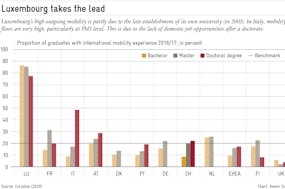Global minimum tax, unresolved relations with the EU, shortage of qualified personnel, the banking crisis: the risks for Switzerland as a business location seem countless. For years, there have been warnings of a deterioration of framework conditions – even Avenir Suisse occasionally joined in. But what is the real state of Switzerland’s competitiveness and quality as a business location?
In this regard, rankings comparing countries are an important source of information. Each of these is based on a large number of different indicators, which are weighted and aggregated into an overall index. Breaking down information into an easy-to-understand ranking facilitates global comparison and is easy to communicate to the general public. It is therefore not surprising that the media, in addition to governments and NGOs, regularly pay particular attention to these rankings.
The amount of such (country) comparisons has skyrocketed over the past two decades. Hardly a day goes by without a new ranking being published: Where do the happiest people live? Which countries are corrupt? What is the most expensive city? Everything is assessed and put into a ranked list.
While some are mainly entertaining, others have an important (inter)national influence: education managers around the world must have sleepless nights every three years when the OECD publishes its influential Pisa study. A poor student performance stirs up emotions nationwide, education reforms are demanded, and funds are redistributed.
How the world rates Switzerland
A wealth of global competitiveness and location quality indicators are published every year. Below we have traced 22 of the most important and most discussed rankings back to the year 2000. From innovation and corruption to the general feeling of happiness: How does Switzerland perform in different areas? Are we losing ground over the years?

The chart shows that Switzerland has achieved top positions in many rankings for years. The country is an undisputed leader, particularly regarding innovation and talent attraction, although both rankings are likely to be mutually dependent to a certain extent. Despite losing a few ranks, there is no evidence of a general downward trend.
Switzerland’s performance when it comes to business regulation is less promising (“Doing Business” report; see discussion below and here). There is also still room for improvement regarding future technologies. The country is not (yet) among the leading nations in the field of artificial intelligence. Furthermore, the cost of living in Switzerland is among the highest in the world (“Cost of Living” index), Swiss success comes with a price.
Problematic methods
A closer look at each index and changes over time not only reveals interesting facts about Switzerland, but also about the rankings themselves. And it shows why such rankings should not be over-interpreted.
While the best indices are based on meticulous and careful data analysis, others are based on rather shaky figures. The indicators do not always measure the same thing in all countries. “Hard” statistics are supplemented with surveys and assessments. The choice of indicators always represents a subjective selection. Furthermore, the selection of indicators, their weighting or the number of countries included are often adjusted over time. Such changes make it difficult to draw comparisons over time.
The “Global Competitiveness” report of the World Economic Forum (WEF) measured the global competitiveness of countries every year until 2019. Having led the field for years, Switzerland dropped to fifth place in 2018 and 2019. This was largely due to a methodological adjustment.
The methodology was also a recurring theme in the World Bank’s “Doing Business” report, which examined the regulatory climate for companies. The choice of target objectives, the unusual stability of many indicators and the reliability of data collection have given rise to criticism over the years. Switzerland fell further and further behind in this ranking and was still in 36th place in 2020. An analysis of each year shows that Switzerland’s fall was relative. The regulatory environment has hardly changed in the period in question. However, other countries have improved and overtaken Switzerland.
The incentives associated with rankings
Where great importance is attached to rankings, (perverse) incentives can be created. Instead of addressing the most relevant weaknesses, attention is directed at indicators that are easiest to manipulate. Conveniently, some ranking providers offer corresponding consultations. If decision-makers are guided by rankings, they can sometimes take on a self-fulfilling character. Rankings then not only reflect reality, but also cement (and homogenize) a predetermined ideal themselves.
The problem of incentives is evident in the influential university rankings – in which the ETH Zurich shines particularly bright. Rankings are often criticized for focusing too much on measurable output (e.g. number of publications) and neglecting qualitative factors (e.g. standard of teaching). This can lead to universities starting expensive collaborations with top researchers from abroad (for the sake of publication figures) or recruiting an excessive number of international students (as their share has a positive impact on the ranking). For these reasons too, the University of Zurich recently decided to withdraw from the Times Higher Education ranking.
However, the incentives can also have strange consequences for the ranking providers themselves. For example, the World Bank’s “Doing Business” reports mentioned above revealed more than just weak methods. The index was discontinued in 2021 due to data manipulation and the influence of third parties.
Nevertheless, rankings can’t be ignored
Rankings can be criticized but they cannot be ignored. Despite justified concerns, they fulfill important functions. They reduce complexity and thus enable comparisons across borders. In the face of increasing competition between countries and institutions, this kind of information is all the more important. It provides orientation and makes it easier to recognize progress and regression and to hold politicians accountable.
Ideally, rankings stimulate competition and provoke improvements. This is exactly what Avenir Suisse intends to do with its regular cantonal and city monitoring and the annual “Freedom Index”. These comparisons aim to encourage cantons and communes to learn from each other.
Switzerland has hardly lost any of its appeal as a business location over the years. This is both promising and dangerous at the same time: success and prosperity are satisfying, but fleeting. Good rankings can tempt us to play down problems and put reforms on the back burner. In an international competition, however, standing still means going backwards. The gap between competitors in various rankings was often greater in the past. Those who focus solely on the position in the ranking, however, do not realize this.






